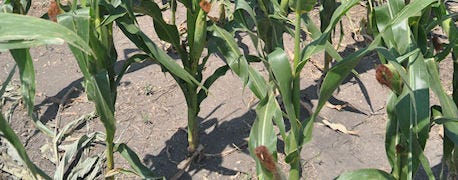
It's official. The U.S. Drought Monitor Map now shows that all of Kansas is some level of drought.
Four counties, and portions of a few others, are merely "abnormally dry." The rest of the state is in moderate to severe to extreme drought. And most of the state is in either severe or extreme.
The good news, so far, is that we are not yet as bad off as we were last year – sort of.
We don't have as much of the state in extreme drought. But we have more of the state in severe drought and even more in moderate drought.
Most recently, we've entered a heat wave, with daily temperatures exceeding 100 degrees and humidity dropping into the single digits, pushing fire risks to extreme levels.

All Kansas In Drought; Majority Severe To Extreme
This is the time of year when this is really, really bad. We just emerged from May and June. These are our traditionally wettest months of the year. Even a moderate departure from normal rainfall the rest of the summer leaves us with almost NO moisture and no hope of getting a 2013 wheat crop off to a hopeful start.
In northwest and west central Kansas, where the drought is taking a heavy toll for the second year in a row, wheat grower and seedsman Vance Ehmke says it is the worst conditions he has ever seen.
"There's ground blowing everywhere," he said. "Even the no-till farmers are out there trying to figure out what to do to stop it. When you have ground that has been no-till for 10 or 12 years and it's blowing, you know things are really, really bad."
For much of western Kansas, winter snows were a salvation for the winter wheat crop and fields were harvested, even if they only yielded 10 to 20 bushels to the acre. But now that wheat is off the ground, the dry and brittle residue is worrying a lot of farmers.
It worries fire marshals as well. Most are very concerned that Fourth of July celebrations this year will ignite a spate of wildfires.
So if you are celebrating the Fourth with a few "bombs in air" keep in mind they can kindle the land into flame in a heartbeat. And Paul Revere aside, that's NOT what you want to do.
About the Author(s)
You May Also Like






